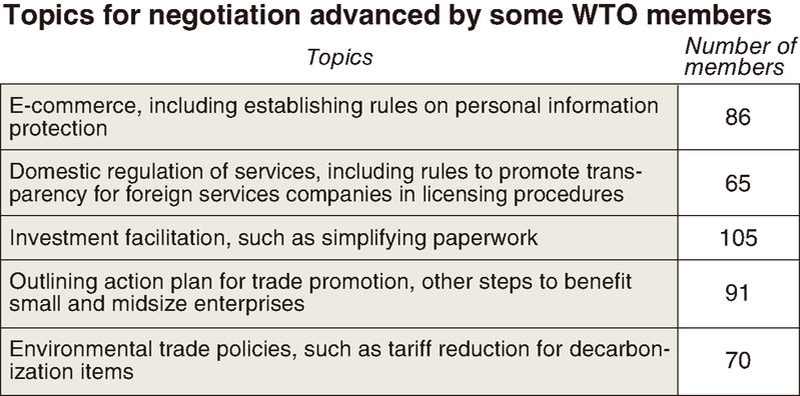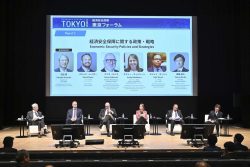
10:27 JST, December 25, 2021
A total of 86 World Trade Organization member countries and regions, including Japan, the United States and European nations, agreed earlier this month on eight articles regarding electronic commerce, including consumer protection and government data disclosure.
In principle, the WTO requires unanimous consent from its 164 members. However, it is often difficult to reach consensus between developed and developing countries and regions due to conflicting opinions. Considering such a situation, some members who share certain objectives are taking initiatives to put rules in place in specific fields of WTO negotiations.
The eight articles include “online consumer protection,” such as prohibiting fraudulent activities that cause harm to consumers, and “open government data,” which encourages development of mainly small and medium-sized enterprises. The WTO had no common rules on e-commerce even though the volume of cross-border data flows approximately quintupled in the five years to 2020 due to digitization. It is the first time the members have agreed on individual articles.
In the field of e-commerce, about 20 items are viewed as still to be negotiated, including customs duties on electronic transmissions, with the aim of reaching general agreement by the end of 2022.
Concerning domestic rulemaking on services businesses by some WTO member countries and regions, Japan, the European Union and China have been participating in negotiations in all fields, while the United States decided not to participate in some of them. India and South Africa have opposed the framework on the grounds that it is led by only certain countries and regions and therefore does not respect the WTO principle of unanimity.
Tsuyoshi Kawase, a professor of international economic law at Sophia University, said, “If an agreement on trade liberalization is applied only to some countries and regions, it may violate most-favored-nation treatment, which prohibits discriminatory treatment among members. If it is agreed and implemented within the WTO framework, it must be a mechanism that benefits all members.”
"Business" POPULAR ARTICLE
-

BOJ Gov. Ueda: Highly Likely Mechanism for Rising Wages, Prices Will Be Maintained
-

Japan Govt Adopts Measures to Curb Mega Solar Power Plant Projects Amid Environmental Concerns
-

Core Inflation in Tokyo Slows in December but Stays above BOJ Target
-

Osaka-Kansai Expo’s Economic Impact Estimated at ¥3.6 Trillion, Takes Actual Visitor Numbers into Account
-

Major Japan Firms’ Average Winter Bonus Tops ¥1 Mil.
JN ACCESS RANKING
-

BOJ Gov. Ueda: Highly Likely Mechanism for Rising Wages, Prices Will Be Maintained
-

Japan Govt Adopts Measures to Curb Mega Solar Power Plant Projects Amid Environmental Concerns
-

Core Inflation in Tokyo Slows in December but Stays above BOJ Target
-

Osaka-Kansai Expo’s Economic Impact Estimated at ¥3.6 Trillion, Takes Actual Visitor Numbers into Account
-

Major Japan Firms’ Average Winter Bonus Tops ¥1 Mil.



























